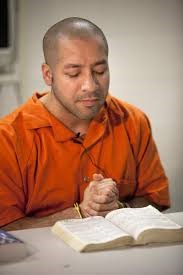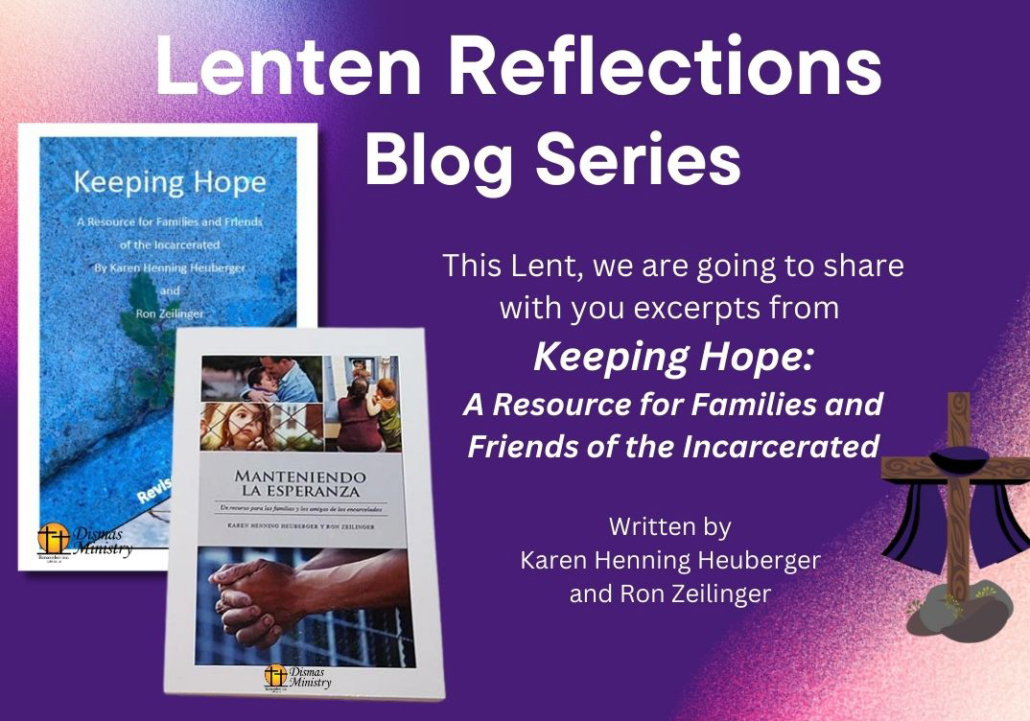This Lent, we are going to share with you excerpts from Keeping Hope: A Resource for Families and Friends of the Incarcerated
Written by Karen Henning Heuberger and Ron Zeilinger
“Moments of Grace: Spirituality and Faith”
While having a loved one in prison is one of the most difficult situations you may have in life, there can be positive experiences in the midst of it all. Most of the families interviewed mentioned faith as a mainstay for getting through the challenges. Maintaining or developing a spiritual life during this experience can affect its impact. No, it won’t make everything easy, but moments of grace can shine through.
Effects of Spirituality
Bringing a sense of spirituality to the experience of having an incarcerated family member or close friend can help you and that person restructure your priorities and help you both make changes in your lifestyle.
 For You – When you bring the lens of personal faith to the experience, it can help you look at things with an overarching perspective. You see not only the suffering of today, but the long-term effects of the situation. For example, through incarceration, a prisoner with an addiction is taken out of his or her normal situation and put into programs that will address the addiction. Healing can occur and have a long-term positive impact on his or her life. Believing that good can come out of a difficult situation can move you beyond fear. It can give you hope and courage.
For You – When you bring the lens of personal faith to the experience, it can help you look at things with an overarching perspective. You see not only the suffering of today, but the long-term effects of the situation. For example, through incarceration, a prisoner with an addiction is taken out of his or her normal situation and put into programs that will address the addiction. Healing can occur and have a long-term positive impact on his or her life. Believing that good can come out of a difficult situation can move you beyond fear. It can give you hope and courage.
Spirituality can also lead you to look outside of your situation. It may draw out your compassion and understanding in ways you haven’t known before – with your inmate, others, and yourself. It can make you want to move beyond a difficult situation and make something constructive flow from it. It may prompt you to reach out to others and have a positive impact on the world. You may choose to be a source of blessing to others and find yourself blessed.
Because of the serious to extreme sacrifices you may have to make in your day-to-day life during this situation, it may help you rely on God more and realize what you truly “need.” You may become more attuned to the good in this world because the little things are even more precious. Being grateful for all the positives during this time is important.
Prayer is also important. It can help you make crucial decisions and help you accept others’ decisions and challenging outcomes. It can help you accept “what is” rather than wishing things were different or worrying about it all. If you are a person of faith, you may feel that all of this is happening for a reason. You may not know the reason, but believe good will come out of it. If you have fallen away from your faith, you may find that the only way to survive is to “get back to God” where you will find comfort.
For Your Loved One – Helping your incarcerated friend or family member grow in faith can foster spiritual rehabilitation, which can have a real impact on his or her not returning to prison.
As O’Connor, Brooks, and Sprauer suggested in their study of religious programming and spirituality with inmates, “Awakening the religious or spiritual domain in a person brings additional hope, encouragement and resources.” (“Spirituality, Religion and What Works: Religious Outcomes This Side of Heaven”, www.oregon.gov
 Prayer can help your loved one become more introspective and come to a place where he or she realizes it was a horrible mistake to commit a crime. When the inmate can get to a place where he or she is willing to admit why, accept responsibility, and face the consequences, real growth is taking place. One’s faith can help him or her reconsider a new lifestyle, find strength to make changes, and start on a new path to wholeness and a productive life.
Prayer can help your loved one become more introspective and come to a place where he or she realizes it was a horrible mistake to commit a crime. When the inmate can get to a place where he or she is willing to admit why, accept responsibility, and face the consequences, real growth is taking place. One’s faith can help him or her reconsider a new lifestyle, find strength to make changes, and start on a new path to wholeness and a productive life.
Because inmates deal with a lot of shame and guilt, faith in a loving and forgiving God can also bring them significant healing. If your family member or friend is having trouble forgiving him or herself for the crime, knowing and understanding that God is more willing to forgive than he or she is willing to ask for forgiveness is a comfort. This truth may move the person to the point where he or she can accept forgiveness. Knowing and accepting that God’s love is unconditional can help overcome low self-esteem, self-hatred, past offenses, past abuse and many other issues. It usually doesn’t happen immediately, but as the prisoner’s faith grows and as you model God’s love and forgiveness, your loved one may slowly find the courage to love him or herself.
Inmates who came from a place of faith and spirituality can help bring that sense of love and healing to others in the institution. Praying with fellow inmates and seeking out the lonely and depressed or just being kind can be invaluable toward developing a calming atmosphere. It colors the experience of incarceration and helps them use that time constructively.
 For Your Relationship – When you bring faith to the relationship, you and your family member or friend can bond in ways you may not have in the past. Praying together, sharing Scripture, talking about how God has been present in each of your lives can put you on common ground and give the relationship a boost. As you both grow spiritually, you often will grow closer as well.
For Your Relationship – When you bring faith to the relationship, you and your family member or friend can bond in ways you may not have in the past. Praying together, sharing Scripture, talking about how God has been present in each of your lives can put you on common ground and give the relationship a boost. As you both grow spiritually, you often will grow closer as well.
If the offender is your spouse, it may help you realize how important the marriage is to each of you as you make the commitment to continue to support each other. This situation can be a real test of your relationship, but can also teach you to trust each other again and bring you closer together as a couple.
 As you make plans with the prisoner for release, prayer can help guide and reassure you. You can both take your decisions to prayer, and then discuss where each of you feels God is leading. Together you can then make the decisions you need to make. Taking it to prayer first can help you be confident your decisions are divinely guided.
As you make plans with the prisoner for release, prayer can help guide and reassure you. You can both take your decisions to prayer, and then discuss where each of you feels God is leading. Together you can then make the decisions you need to make. Taking it to prayer first can help you be confident your decisions are divinely guided.
In whatever way spirituality may come into play for you and your loved one during the incarceration, it can transform the experience from simply an embarrassment and burden to a time of growth. It can help you re-prioritize your life and take pleasure in all the simple gifts God gives. You may even strengthen your relationship and bring peace to each other during a time of uncertainty. God can use this experience to bring good in your life. As one family member said, “Anything to God’s glory”. And with God, you are never alone on this journey.
Those Who Know…
I got to know my son on a spiritual level. We became very close while he was incarcerated through very in-depth sharing about his problems, his plans for the future and life in general, and our spiritual beliefs.
God was always present. He is the one that gave me the strength and courage to continue to live my life, to stay positive, and to be able to be there for my son.
Giving it to the Lord has helped me to get through it and will continue to do so.
When he’s out and on a healthy path…then there will be peace.
Most important is my husband found his faith.
Truthfully, I have not found peace. It does help though to do daily devotions and bible reading with my husband.
His dad and I became reacquainted with an adult son and have remained close.
We pray (a lot!).
God kept her safe from others and herself.
READ MORE FROM KEEPING HOPE BY PURCHASING YOUR COPY ON OUR STORE PAGE. NOW ON SALE $10.



